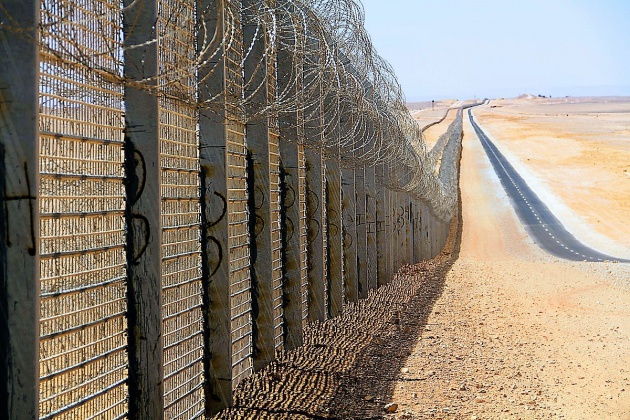Paul Rogers
16 December 2016

Summary
With Donald Trump preparing to be inaugurated next month, his election raises the issue of border security to a new height. Much discussion of the issue focuses on Trump’s proposal to erect a strong protective fence right across the border with Mexico. This, though, is just one example of a world-wide trend seen in South-East Europe, the Middle East, South and South East Asia and Australia and now sub-Saharan Africa. While it has considerable implications for international relations, there are also doubts that it is a plausible response to the sense of insecurity that has become so significant in otherwise secure communities. Israel, as probably the best-developed example of intense border protection, is an illustration of how far the desire for security can go. While serving as a profitable marker for new forms of security, it raises many issues around the nature of security.
Introduction – Kenya and Somalia’s Border Security
Although little noticed in the media, the international boundary between Kenya and Somalia is yet another example of intensive border security. A security structure is currently being constructed by the Kenya Defence Forces (KDF) in response to infiltration by members of the Somalia-based al-Shabab movement. The first three kilometres have just been completed of what is proposed to be a 700-kilometre barrier from the common border with Ethiopia right down to the shores of the Indian Ocean, including a high-tech section of 200 kilometres covering those areas considered at greatest risk of paramilitary infiltration. The first 30 kilometres are scheduled to be completed by the end of March.
The Kenyan border project is part of a world-wide trend which has included rapid developments in South-East European responses to the sudden upsurge in refugee movements in the past two years. Such projects may often attract considerable domestic support, with the unspoken assumption being that they provide protection in an increasingly divided and threatening world. Whether they do constitute a necessary and viable response, though, is open to question, not least because they may serve to create a false sense of security which prevents more fundamental security issues being addressed. Israel’s border protection represents another salient example.
Israel’s Border Protection and the Wider Security Implications
Since its declaration as a State in May 1948, Israel has placed a strong emphasis on secure borders, an emphasis greatly heightened in the wake of the Six Day War in June 1967 and the Yom Kippur War in October 1973. This emphasis on secure borders has been intensified further in recent years with the building of the barriers with the occupied territory of the West Bank, East Jerusalem, Gaza and, most recently, the borders with Egypt and Jordan.
Israel now exists within a very heavily protected external border; in addition to the internal barriers, the border extends some 600 kilometres with Lebanon, Syria, Jordan and Egypt. The naval and coastal defence forces also maintain high levels of security in the Mediterranean and the Gulf of Aqaba. The overall costs of these measures are difficult to quantify, but a recent analysis in a leading US defence journal, quotes a Ministry of Defence source to estimate that the cost of the barrier with the West Bank and East Jerusalem alone has been 14 billion shekels ($3.6 billion) alone over the past fifteen years.
Despite its heavy border protection, Israel has found itself in a near-permanent race to improve the levels of protection in the face of opponents who have “gone underground” to penetrate the barriers. As the Defense News article points out:
“Painful lessons from the 2014 Gaza War exposed Israel’s unpreparedness in the face of infiltration and assault tunnels stretching more than a kilometre inside Israeli territory. In that 50-day war, Israel destroyed 32 tunnels losing dozens of soldiers in 17 days of nearly house-to-house maneuvering operations.”
Since then, Israel has invested heavily in advanced forms of detection, aiming to create what is being called an underground “Iron Dome”, to match the anti-missile shield of the same name. Despite this, the problems are proving formidable in the face of determined opposition. As the same source reports:
“Earlier this year, through improved operational and technological methods — most of which remain classified — Israel discovered another two tunnels reaching into its territory from Gaza.
With some up to 50 meters deep, many tunnels are supported by more than 500 tons of cement arches and come equipped with communications lines, filtration systems and hydraulic cables to transport weaponry. And at 2 meters high and 1.5 meters wide, gear-laden fighters are able to walk or run through such tunnels to kill or kidnap unwitting soldiers or civilians.”
Israel’s border security experience has been followed closely by other military powers. The Pentagon has been involved for nearly a decade in a joint cost-sharing programme. There have been twice-yearly meetings between relevant organisations within the Pentagon and the Israeli Defence Forces (IDF) and the most recent meeting last month led to a programme intended to expand the use of high-tech systems suited to “detecting, mapping and operating in the underground domain”.
This should not be at all surprising given the close relationship between the Pentagon and the IDF, not least in the wake of the considerable help the IDF gave the United States at the time of the Iraq War in the mid-2000s. What is most significant, though, is that US sources now see the Israeli border security experience as highly relevant to the United States’ security concerns. According to Defense News, an Israeli general involved in last month’s meeting commented:
“This is not a threat exclusive to Israel, but one that we’ve been engaged with in a very intense way. But fruits of our joint work with Washington will also support US interests, given the tunnel threat in Mosul, Raka (sic), Afghanistan or even along their southern border.”
With the election of Donald Trump, the US/Israel cooperation in this field is likely to expand, not least because of the administration’s emphasis on control of the US/Mexico border.
The Global Context
From a global historical perspective, the ultra-secure border defences such as those around Israel are hardly new. The “Iron Curtain” between the Warsaw Pact and Western Europe was a remarkable example and North and South Korea’s border is a lingering legacy of the Cold War’s intense border security. Nevertheless, what is happening now in many parts of the world is an expansion of the idea that borders provide sustained security against a human “threat”. This idea was powerfully expressed in the “Breaking Point” poster displayed on the closing days of the Brexit debate in the UK. The poster portrayed what were in reality desperate refugees from Syria, Iraq, Afghanistan and elsewhere trying to move to a better life in Western Europe as threats to the European “way of life”. This distortion was part of a more general political claim by many right-wing populist groups, which depicts Europe as a continent being inundated with hordes of dangerous outsiders, with Muslims often depicted as potential terrorists.
Within this wider claim are the deep-seated views that elite governments have no understanding of the fears and vulnerabilities of ordinary people, that they have failed to offer proper protection and that there must be radical changes towards safer and far better protected countries. This implies far tougher control of entry are needed and it is in this context that attitudes to borders are changing with a marked intensification of the levels of protection desired – a classic “close the castle gates” approach.
There are many flaws with this approach, not least that in a much more globalised and interconnected world it is well-nigh impossible to maintain such control unless, like Israel, it is a small state prepared to isolate itself from its regional cultural base and spend a large proportion of its resources in doing so. Moreover, Israel is exceptional in two other ways in that its need to be “impregnable in its insecurity” means that insecurity is a permanent state of existence, and that it would be unable even to maintain this stance if it was not under the permanent protection of the United States.
The Israeli example is so relevant in the wider global context because it demonstrates the high level that border protection has to reach for it to be remotely effective, and the capacity of opponents to penetrate even those levels. It is essentially a short-term response to an unsolved problem, not to mention a powerful symbol of division and inequality. In Israel’s case, it may be possible to maintain that stance for some years to come, given the wider protection that the United States affords, but in the great majority of the world it offers now more than a false answer – an illusion of security that actually militates against addressing the underlying issues, even if there are healthy profits to be made in the process.
Conclusion
The fundamental drivers of insecurity, as analysed in recent years by Oxford Research Group and others, are the widening wealth-poverty divide and the onset of severe environmental limits, especially climate change. Unless these are addressed at root the consequences will be, among many other forms of instability, far greater pressures on population movements as increasing numbers of desperate people seek to move to a better life. The central problem with developing increasingly secure borders is that they seem to provide an answer to the problem, but in reality they do no more than constitute a short-term response, thus postponing the time when the underlying problems have to be addressed.
Image credit: Ibodi/Wikimedia
About the Author
Paul Rogers is Global Security Consultant to Oxford Research Group and Professor of Peace Studies at the University of Bradford. His ‘Monthly Global Security Briefings’ are available from our website. His new book Irregular War: ISIS and the New Threats from the Margins will be published by I B Tauris in June 2016. These briefings are circulated free of charge for non-profit use, but please consider making a donation to ORG, if you are able to do so.
Copyright Oxford Research Group 2016.






